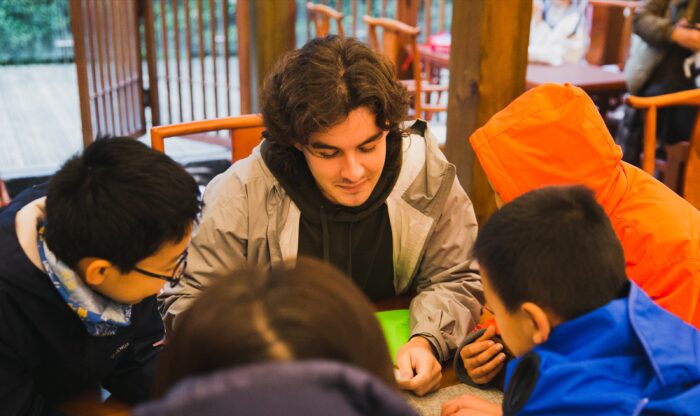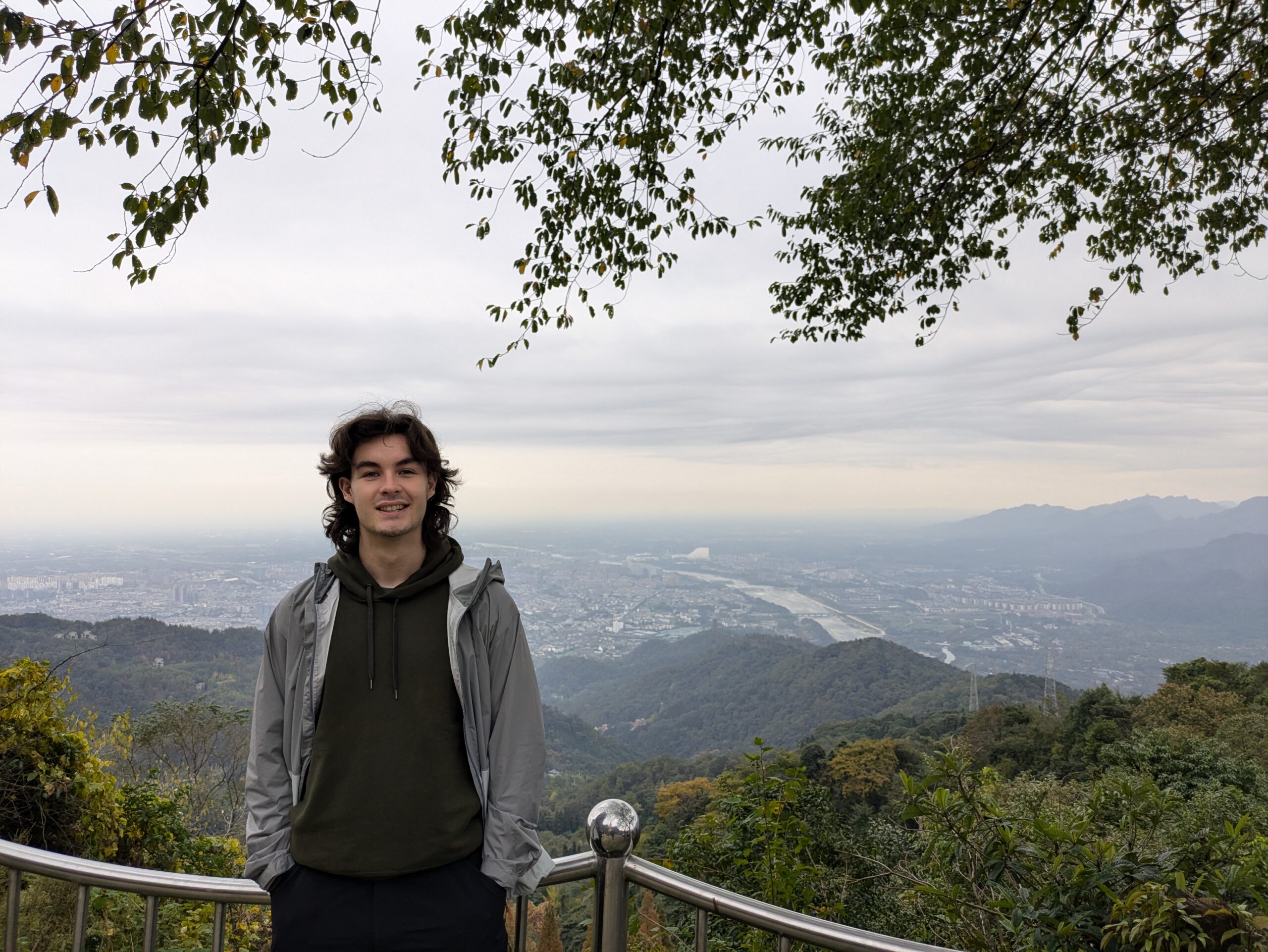Written by Matthew, 2024 McCall MacBain International Fellow from China
Yesterday, I spent the day in the mountains west of Chengdu. My hosts run nature education activities for families, and this weekend they invited me to tag along. In the morning, as we waited for everyone to arrive, I passed the time practicing my Mandarin with the parents and losing to the kids at wǔzǐqí, a Chinese board game. After lunch, the group hiked to the peak on a trail marked by Tibetan prayer flags and Buddhist shrines burning incense. In Canada, the leaves would have turned weeks ago, but here I’ve watched the trees stay stubbornly green and full. The gingkos, at least, finally relented: as we walked, their brilliant yellow fans swished underfoot. At the top, as we passed around snacks and admired the view of Dujiangyan, a city known for its thousand-year-old irrigation system, I was struck by how easy the whole day felt. Meeting new people, exploring a new place, learning new vocabulary and cultural traditions has become a daily occurrence. Here, novelty is the norm.
I left home in Ontario three months ago, landing on my homestay’s doorstep after thirty hours, three flights, a luggage mix-up that sent me sprinting and panicked through the Shanghai airport, and what I later learned was a wildly overpriced taxi ride. At first, everything was overwhelming. Day-to-day tasks like ordering food, renting a bike, and navigating the city—the accurate map apps have no English version—all took more energy than I expected. I am noticed more often than I am used to here, too: kids whisper wàiguórén (foreigner) when I walk past, and even adults occasionally stare or take pictures. Add in weeks of blistering heat and humidity, and it became tempting to skip meals and retreat to my apartment’s AC.

But gradually, I adjusted. I made friends with other language students and began exploring everything the city has to offer. With a population of 16 million, Chengdu dwarfs any other city I’ve lived in, and I feel like I’ve barely scratched the surface. From the lan kwai fong nightlife district, to the city’s parks and historical sites, to the Tianfu Greenway, a 100 km cycling loop around the city, there is always more to explore. Last Friday, I spent the night at a small punk show, listening to local bands perform and making what conversation I could with the people around me.
Those conversation skills have been built slowly, as I learn more Mandarin week after week. Learning the language has come with plenty of challenges. Each syllable in Mandarin has an associated tone—the pitch is either falling, rising, flat and high, falling and rising, or neutral—each of which has a different meaning, and all of which I find difficult to pronounce. At first, reading and writing seemed even worse: each character presented as an indecipherable tangle of lines whose meanings and pronunciations I couldn’t begin to guess. I learned each new word by rote, too much of a beginner to pick up phrases just from hearing them.
But I’ve enjoyed the challenge, and the more I’ve learned, the quicker progress has felt. Learning new characters with flashcards has become easier as I have become more familiar with the strokes, radicals, and common components. Reading has quickly become my favourite part of studying the language. I still struggle with pronunciation—often, I’ll think I said a sentence perfectly only to be met with a confused stare—but I’m excited to keep learning and practicing throughout the year.

For now, I can at least have short conversations, speak to shop owners, and most importantly, order food. Most nights, I get dinner at a night market near my apartment, and by the end of my time in Chengdu I hope to try every stall. I have been building my spice tolerance, adjusting to the numbing of Sichuan peppercorns and the heat of xiǎomǐlà chilis. Among all the food I’ve tried, mapo tofu (麻婆豆腐), chāoshǒu (抄手), chuànchuàn (串串香), ròujiāmó (肉夹馍), hot pot (火锅), and homemade spicy rabbit stand out as favourites. When I’m eating with locals, I’m always hospitably encouraged to eat more, to try another dish, to keep going even when I feel like I can’t eat another bite. It feels rude to decline, so I’ve learned to start saying I’m full about half an hour before it’s actually true. That way, by the time I’m really full, I will have insisted enough that they’ll believe I’ve had my fill.
While I’m here, I’m trying to see as much of China as I can. In October, I took a trip with a classmate to Kunming, in the southern Yunnan province, for a few days. (Traveling during national holidays, it turns out, is not a great idea. I’ve never seen hiking trails so packed.) Another day, I went on a whim to visit the Leshan Giant Buddha, an awe-inspiring twelve-hundred-year-old statue whose toenails could seat two of me. I have plans to go see more: the Great Wall and ancient Buddhist caves in north-western Gansu province, the Terracotta Warriors in Xi’an, the labyrinthine, vertiginous architecture of Chongqing, then onto Beijing for my academic term.I can’t wait to see more of China, to meet more people, to keep growing and becoming more adaptable. I’m excited to keep learning the language so I can speak with everyone I meet, make more local friends, ang gain a deeper understanding of the culture. I am so grateful for the chance to come to Chengdu. As long as I’m here, every day, I’ll keep trying something new.
The McCall MacBain International Fellowships are open to undergraduate students of McGill University, University of Manitoba, Dalhousie University, and McMaster University, along with recipients of the McCall Huron County and MacBain Niagara Falls Scholarships studying at any Canadian institution. The Fellowships accept applications between October to January each year.

